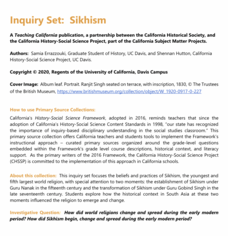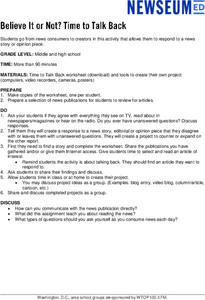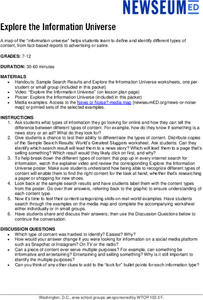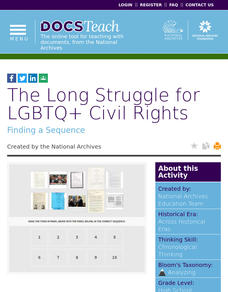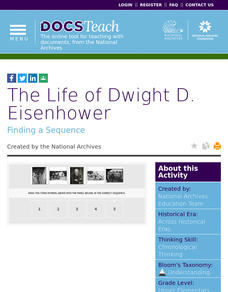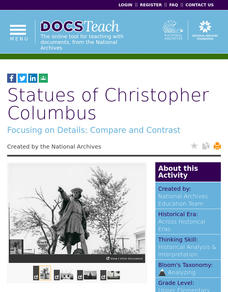British Council
Class Journals
Who are you? Scholars draw a shield on the front of their journals that includes four items with which they identify and discuss them with a partner. Readers then use topic suggestions from the board to write about themselves on the...
University of California
Tenochtitlán
Behold, the Great Aztec empire! Scholars use primary sources to understand the impact of the Aztec city Tenochtitlan. Academics complete a worksheet and participate in group discussion to understand how Tenochtitlan was a melting pot for...
University of California
The Virgin of Guadalupe
A worldly resource focuses on the transfer of goods, ideas, and religion that took place as part of the Columbian exchange. Academics view sources such as text and artwork to help them complete a worksheet.
University of California
Sikhism
How does a new religion start? The informative resource highlights the Sikhism religion. Academics learn how the religion was created and spread throughout the ancient world. Scholars view a series of primary sources and complete a...
University of California
Was Slavery Always Racial?
The lesson focuses on slavery in the ancient world and asks academics to decide if it was always about race. Scholars view primary sources, participate in a short discussion, and complete a worksheet to understand how slavery in the...
University of California
Influences from South to Southeast Asia
In ancient times, people along trade routes exchanged ideas in addition to goods. Scholars view eight primary sources, such as artwork, to understand how India influenced southern Asia. Academics participate in a short group discussion...
University of California
The Mongol Empire
Scholars review eight sources to learn about the impact of the Mongol Empire and their leaders, such as Genghis Khan. Academics learn how the Mongols destroyed states but also increased connections with the rest of the world. To finish,...
University of California
Interactions in Baghdad and the Abbasid Caliphate
An interesting resource focuses on the cultures of different peoples that have lived in Baghdad and their interactions. Academics view 11 sources to understand how Baghdad has been home to people of many faiths and cultures throughout...
Franklin D. Roosevelt Presidential Library & Museum
The Constitution
Three activities focus on the need to have rules. Young historians are first challenged to suggest rules for their classroom and then to create their own constitution that balances the need for freedoms and protections. The third...
Franklin D. Roosevelt Presidential Library & Museum
Developing Your Voice and Your Right to Free Speech
Three activities focus on the First Amendment, especially the freedom of speech. Scholars craft a letter to the President of the United States and express their views about a topic important to them. Another activity has participants...
Franklin D. Roosevelt Presidential Library & Museum
Pearl Harbor Activity #3: Public Opinion Word Cloud
As part of a study of the December 7, 1941 attack on Pearl Harbor, young historians imagine the feelings of those who lived during the attack by creating a word cloud of 10 words they think express the emotions of people at that time....
Franklin D. Roosevelt Presidential Library & Museum
Pearl Harbor Activity #1: Newspaper or Radio Account
After listening to President Franklin D. Roosevelt's "Day of Infamy" speech, young historians research information about the Japanese attack on Pearl Harbor, possible motives for the attack, and the consequences of the attack. Scholars...
Newseum
Believe It or Not? Time to Talk Back
Young journalists select a news story, editorial, or opinion piece that they disagree with or one that leaves them with questions. They then create their report in response and share it with the class.
Newseum
Explore the Information Universe
Distinguishing among different types of content when conducting online searches can be a challenge. An informative resource helps researchers identify different types of content, from fact-based reports to ads, from propaganda to satire....
British Council
Buy. Use. Toss.
Responsible consumption is never a waste of time. Using the engaging resource, scholars learn about the impact of waste on the planet, sorting trash into necessary and luxury piles. They then analyze their consumption habits, writing an...
Bonneville
Informative Writing: Where Does Energy Come From?
Get energized about all the different sources of energy. A research project has scholars investigate a renewable or non-renewable energy type of their choice. They write a report on their findings and decide on a way to publish their work.
Center for History Education
U.S. Foreign Policy and the Iran-Contra Affair: Was Oliver North a Patriot, a Pawn, or an Outlaw?
If you had to write a song about Oliver North, would it be a ballad or a dirge? If you had to put him on a trading card, would he be a hero or the bad guy? Young historians decide for themselves after examining documents from the...
DocsTeach
Uncle Sam and the American Diet
Uncle Sam wants you to follow the food pyramid! Scholars analyze two images of propaganda posters the government created to promote the food pyramid. Academics complete a worksheet to understand the impact of the campaign and end the...
DocsTeach
The Long Struggle for LGBTQ+ Civil Rights
Academics analyze 10 primary documents and photos to create a timeline of the LQBTQ+ movement. The activity includes an online worksheet. Scholars also participate in a group discussion to understand the long struggle the LGBTQ+...
DocsTeach
The Life of Dwight D. Eisenhower
A captivating activity uses images to help pupils understand the life of President Eisenhower. Scholars put the images in chronological order and read the captions to get a better understanding of the war hero turned president.
DocsTeach
The 19th Amendment and the Road to Universal Suffrage
Your vote matters! An informative activity focuses on the Nineteenth Amendment and explains how it paved the way for universal voting rights. Young historians analyze several documents and a complete a worksheet, describing the impact of...
DocsTeach
Statues of Christopher Columbus
Scholars compare statues of Columbus and discuss how each memorial captures his personality. Academics also complete a worksheet and discuss how some people have called to remove statues honoring Columbus.
DocsTeach
Memorials, Statues, and Monuments to George Washington
An activity uses images of George Washington's statues to compare how they represent different aspects of his life. Scholars complete a worksheet based on their findings and then share as a group how they would construct a new memorial...
DocsTeach
Memorializing Abraham Lincoln in Washington, DC
The legacy of President Lincoln continues to endure. Scholars view images of three statues that have been created to honor President Lincoln. Academics analyze the three images and share their findings in a group discussion format. Young...





